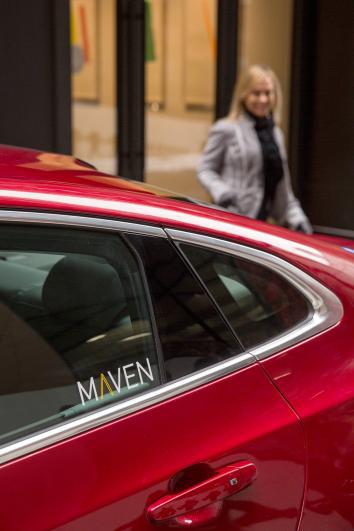Uber. Tesla. Zipcar. General Motors?
Unlikely as it may seem, the 107-year-old Detroit automaker is trying to position itself among the upstarts that are reshaping the automotive industry. And it’s doing a surprisingly convincing job of it.
On Thursday, GM announced the launch of a new car-sharing service called Maven, a Zipcar-like concept that will allow drivers to pick up a Chevy at a designated parking spot and unlock it with their smartphones. Since all the cars will come with Apple CarPlay and Android Auto, their dashboards will be instantly personalized to the driver’s smartphone settings. The service, which will start in Ann Arbor, Michigan, will be free to join, and cars will cost $6 an hour. Customer service, interestingly, will be handled via WhatsApp.
The Maven news is just the latest of a flurry of future-focused moves by GM. In the past month, it has launched the all-electric Chevy Bolt, announced a partnership with Lyft to build driverless taxis, and bought Sidecar’s ride-sharing technology and remaining assets. It has also been ramping up its partnership with Mobileye, whose mapping technology it’s using in its autonomous driving systems.
All of a sudden, GM is a significant player in the four biggest trends that are upending its legacy business: electrification, automation, connectivity, and sharing. Rather than try to beat the forces arrayed against it, General Motors is joining them.
“We believe there will be more change in our industry over the next five years than there has been over the last 50,” GM President Dan Ammann told reporters on Wednesday. “We want to make sure we’re at the forefront of that.”
The company’s business, Ammann acknowledged, has been built on the “owner-driver” model that has historically dominated the industry. That model won’t disappear, he predicted. But already, “we do see a significant change in consumer behavior,” especially in cities, where people are eschewing ownership and hopping into Ubers and Zipcars when they need a ride.
Maven, the new car-sharing service, plays into that future in two ways. First, obviously, GM believes Zipcar-style car-sharing will continue to thrive alongside Uber-style ride-hailing. (The difference, in case it wasn’t clear: Car-sharing involves picking up a car at an appointed spot and driving it yourself, whereas ride-hailing means calling a car that’s driven by someone else.)
More importantly, Maven lays important groundwork for a future in which cars drive themselves, as Wired’s Alex Davies points out. For GM to succeed in that future, it will need not only a fleet of rentable vehicles, but a loyal customer base, an app that allows people to personalize their in-car experience—and, on a practical level, a bunch of parking spots equipped with electric charging stations. Maven could give it all of those things. It helps that the company is already a leader in connectivity, thanks to its OnStar in-car navigation and communication service.
Multinational giants are often tempted to go big when they launch something new, leveraging their brand and customer base to maximize the splash. But, in keeping with the startup mentality, GM is starting out small. Maven will launch with just 21 parking spots in Ann Arbor, targeting University of Michigan students and faculty, building on a pilot program already in place there. Early users will be able to communicate directly with members of GM’s 40-person Maven team by sending them messages on WhatsApp. In the coming months, the service will expand to take in existing pilot programs in New York City and Germany and will launch a residential car-share in Chicago, each of which will serve only several thousand users at first. (The New York City project is also a residential car-share, while the German one is a peer-to-peer sharing network.)
That might all sound insignificant in comparison with the scope of GM’s existing business. The advantage of starting locally, however, is that the company will have a chance to closely study user behavior and listen to feedback on an individual basis. Ultimately, that could allow it to build a service that succeeds on its own merits, rather than on the strength of the GM nameplate and PR machine.
Maybe a company as big as GM won’t be able to pull it off. Maybe it’s too deeply invested in what it calls the owner-driver model to lead the way in overthrowing it, especially after a handful of trendier, techier startups have gotten a substantial head start. But it’s certainly worth the relatively small cost to give it a try. And who knows? Starting small and local seemed to work pretty well for Uber, Tesla, and Zipcar.
